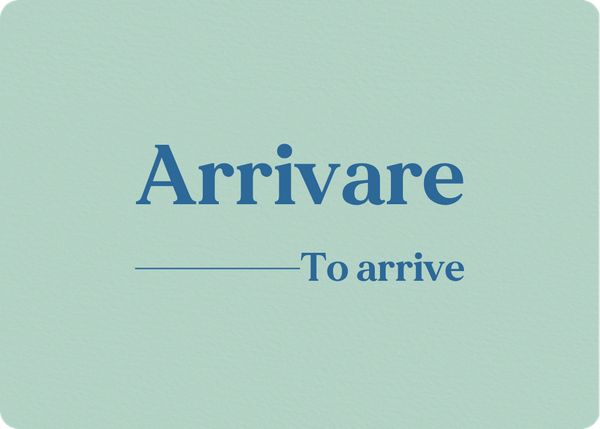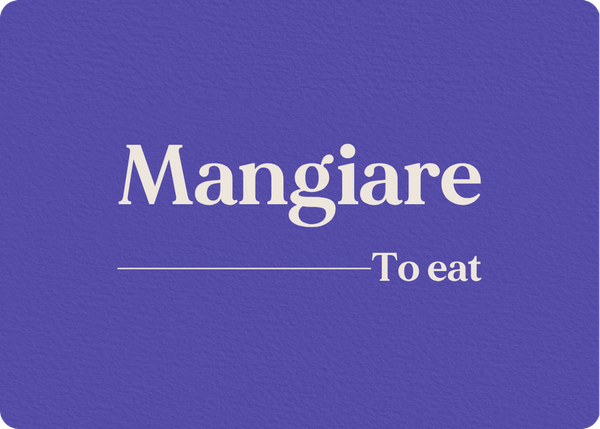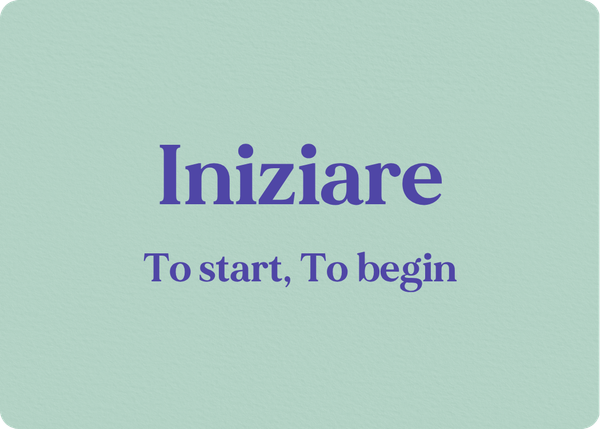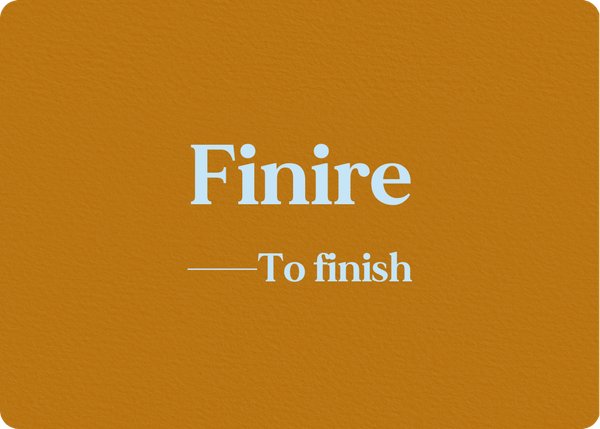What is Arrivare?
Arrivare is an Italian verb meaning "to arrive", "to reach", or "to come". It belongs to the first conjugation (-ARE verbs) and follows regular conjugation patterns, making it one of the easier verbs for Italian learners to master. This verb is useful for expressing travel and movement, achievement and success.
Key Features of Arrivare:
- Type: Regular first conjugation verb (-ARE)
- Meaning: To arrive, to reach, to come, to get to
- Auxiliary verb: Uses "essere" (to be) for conjugation in compound tenses
- Past participle: Arrivato
Indicativo – Indicative Mood
Presente (Present Tense)
| Person | Conjugation |
|---|---|
| io | arrivo |
| tu | arrivi |
| lui/lei | arriva |
| noi | arriviamo |
| voi | arrivate |
| loro | arrivano |
Example:
Arrivo da te tra cinque minuti!
I'll be at your place in five minutes!
Passato Prossimo (Present Perfect)
| Person | Conjugation |
|---|---|
| io | sono arrivato/a |
| tu | sei arrivato/a |
| lui/lei | è arrivato/a |
| noi | siamo arrivati/e |
| voi | siete arrivati/e |
| loro | sono arrivati/e |
Example:
Siamo arrivati a Venezia alle otto di sera.
We arrived in Venice at eight in the evening.
Imperfetto (Imperfect)
| Person | Conjugation |
|---|---|
| io | arrivavo |
| tu | arrivavi |
| lui/lei | arrivava |
| noi | arrivavamo |
| voi | arrivavate |
| loro | arrivavano |
Example:
Solitamente Sara arrivava a scuola in anticipo, perché i suoi genitori la accompagnavano presto.
Sara usually got to school early because her parents dropped her off pretty early.
Trapassato Prossimo (Past Perfect)
| Person | Conjugation |
|---|---|
| io | ero arrivato/a |
| tu | eri arrivato/a |
| lui/lei | era arrivato/a |
| noi | eravamo arrivati/e |
| voi | eravate arrivati/e |
| loro | erano arrivati/e |
Example:
Quando ho chiamato, ho saputo che Luigi era già arrivato in ufficio.
When I called, I found out that Luigi had already gotten to the office.
Passato Remoto (Simple Past)
| Person | Conjugation |
|---|---|
| io | arrivai |
| tu | arrivasti |
| lui/lei | arrivò |
| noi | arrivammo |
| voi | arrivaste |
| loro | arrivarono |
Example:
Arrivammo in cima alla montagna stanchi ma felici.
We arrived at the mountain top tired but happy.
Trapassato Remoto (Past Anterior)
| Person | Conjugation |
|---|---|
| io | fui arrivato/a |
| tu | fosti arrivato/a |
| lui/lei | fu arrivato/a |
| noi | fummo arrivati/e |
| voi | foste arrivati/e |
| loro | furono arrivati/e |
Example:
Quando fu arrivato a destinazione, mandò un messaggio per avvisare.
When he got to his destination, he sent a message to let them know.
Futuro Semplice (Simple Future)
| Person | Conjugation |
|---|---|
| io | arriverò |
| tu | arriverai |
| lui/lei | arriverà |
| noi | arriveremo |
| voi | arriverete |
| loro | arriveranno |
Example:
I nostri ospiti arriveranno domani pomeriggio.
Our guests will arrive tomorrow afternoon.
Futuro Anteriore (Future Perfect)
| Person | Conjugation |
|---|---|
| io | sarò arrivato/a |
| tu | sarai arrivato/a |
| lui/lei | sarà arrivato/a |
| noi | saremo arrivati/e |
| voi | sarete arrivati/e |
| loro | saranno arrivati/e |
Example:
Domani sera a quest'ora saremo arrivati a Bologna.
We'll be in Bologna by this time tomorrow evening.
Congiuntivo – Subjunctive Mood
Presente (Present Subjunctive)
| Person | Conjugation |
|---|---|
| che io | arrivi |
| che tu | arrivi |
| che lui/lei | arrivi |
| che noi | arriviamo |
| che voi | arriviate |
| che loro | arrivino |
Example:
Spero che il pacco arrivi entro questa settimana.
I hope the package arrives within this week.
Passato (Past Subjunctive)
| Person | Conjugation |
|---|---|
| che io | sia arrivato/a |
| che tu | sia arrivato/a |
| che lui/lei | sia arrivato/a |
| che noi | siamo arrivati/e |
| che voi | siate arrivati/e |
| che loro | siano arrivati/e |
Example:
È possibile che Valerio sia arrivato mentre ero fuori.
Valerio may have arrived while I was out.
Imperfetto (Imperfect Subjunctive)
| Person | Conjugation |
|---|---|
| che io | arrivassi |
| che tu | arrivassi |
| che lui/lei | arrivasse |
| che noi | arrivassimo |
| che voi | arrivaste |
| che loro | arrivassero |
Example:
Il coach voleva che noi arrivassimo puntuali all’allenamento.
The coach wanted us to get to practice on time.
Trapassato (Past Perfect Subjunctive)
| Person | Conjugation |
|---|---|
| che io | fossi arrivato/a |
| che tu | fossi arrivato/a |
| che lui/lei | fosse arrivato/a |
| che noi | fossimo arrivati/e |
| che voi | foste arrivati/e |
| che loro | fossero arrivati/e |
Example:
Se tu fossi arrivata almeno mezz'ora fa, avresti trovato ancora qualche parcheggio.
If you had gotten there at least half an hour earlier, you would’ve still found some parking.
Condizionale – Conditional Mood
Presente (Present Conditional)
| Person | Conjugation |
|---|---|
| io | arriverei |
| tu | arriveresti |
| lui/lei | arriverebbe |
| noi | arriveremmo |
| voi | arrivereste |
| loro | arriverebbero |
Example:
In bicicletta arriveresti molto prima.
On a bike, you’d get there much earlier.
Passato (Past Conditional)
| Person | Conjugation |
|---|---|
| io | sarei arrivato/a |
| tu | saresti arrivato/a |
| lui/lei | sarebbe arrivato/a |
| noi | saremmo arrivati/e |
| voi | sareste arrivati/e |
| loro | sarebbero arrivati/e |
Example:
Se il volo non fosse stato in ritardo, saremmo arrivati ieri sera.
If the flight hadn't been delayed, we would have arrived last night.
Imperativo (Imperative)
| Person | Conjugation |
|---|---|
| (tu) | arriva |
| (lui/lei) | arrivi |
| (noi) | arriviamo |
| (voi) | arrivate |
| (loro) | arrivino |
Example:
Arriva in orario stasera!
Arrive on time tonight!
Indefinite Moods
Infinito (Infinitive)
- Presente (Present): arrivare (to arrive)
- Passato (Past): essere arrivato (to have arrived)
Examples:
È difficile arrivare da te con questo temporale!
It's difficult to get to your place with this storm!
Dopo essere arrivato in stazione, ho chiamato un taxi.
After arriving at the station, I called a taxi.
Participio (Participle)
- Passato (Past): arrivato (arrived)
Example:
La lettera arrivata ieri contiene buone notizie.
The letter that arrived yesterday contains good news.
Gerundio (Gerund)
- Presente (Present): arrivando (arriving)
- Passato (Past): essendo arrivato (having arrived)
Examples:
Arrivando senza avvisare, li abbiamo colti di sorpresa.
We caught them by surprise by showing up unannounced.
Essendo arrivato in anticipo, ho potuto preparare tutto con calma.
Since I arrived early, I was able to prepare everything at a relaxed pace.
The verb Arrivare at a glance: Key tenses you need
| Present | Present Perfect | Imperfect | Present Subjunctive | Imperfect Subjunctive | Present Conditional |
|---|---|---|---|---|---|
| io arrivo | io sono arrivato/a | io arrivavo | che io arrivi | che io arrivassi | io arriverei |
| tu arrivi | tu sei arrivato/a | tu arrivavi | che tu arrivi | che tu arrivassi | tu arriveresti |
| lui/lei arriva | lui/lei è arrivato/a | lui/lei arrivava | che lui/lei arrivi | che lui/lei arrivasse | lui/lei arriverebbe |
| noi arriviamo | noi siamo arrivati/e | noi arrivavamo | che noi arriviamo | che noi arrivassimo | noi arriveremmo |
| voi arrivate | voi siete arrivati/e | voi arrivavate | che voi arriviate | che voi arrivaste | voi arrivereste |
| loro arrivano | loro sono arrivati/e | loro arrivavano | che loro arrivino | che loro arrivassero | loro arriverebbero |
Conclusion
Mastering the conjugation of "arrivare" is useful for expressing arrival, movement, and reaching destinations in Italian. As a regular first conjugation verb, it follows standard patterns throughout all tenses.
Remember the key points:
- Uses "essere" as auxiliary verb in compound tenses
- Regular first conjugation verb (-ARE) with standard patterns throughout all tenses
- Past participle is "arrivato"
- Essential for describing when someone or something reaches a place or point in time
Keep practicing with real sentences and contextual examples to master this Italian verb!





